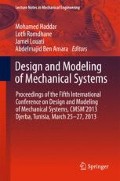Abstract
In this study we were interested in the behavior of two aluminum alloys (2024 T351 and 7075 T7351) requested by a simple overload with an aim of determining the number of cycles of delay of each one and of comparing their behavior various environments (air and vacuum).For that, we carried out fatigue tests stopped by a simple overload with a rate of overload τ = 2 and reports/ratios of loads R=0,1 and R=0,5.The results obtained show that the number of cycles of delay of alloy 2024 T351 is higher than that of the alloy 7075 T7351 and that the number of cycles of delay is more significant in the vacuum than with the air for two materials.This observation will lead us to make a judicious choice as for the industrial use (aeronautical) of two materials.
Access this chapter
Tax calculation will be finalised at checkout
Purchases are for personal use only
Preview
Unable to display preview. Download preview PDF.
References
Schijve: Prediction Methods for Fatigue Crack Growth in Aircraft Material. ASTM STP 700, 3 (1979)
Von Euw, E.F.J., et al.: Stress Analysis and Growth of Cracks: Proceedings of the 1971 National Symposium on Fracture Mechanics: Part 1. ASTM STP 513, 230 (1972)
Wei, R.P.: Load interaction effects on fatigue crack growth. NASA CR, 2239 (1973)
Bathias, C.: Effects of overload on fatigue crack growth in some aluminium alloys. In: International Conference of Mechanical Behavior of Materials, Boston, pp. 16–20 (1976)
Ranganathan, et al.: Overload Effects in Aluminum Alloys: Influence of Plasticity and Environment. Journal of ASTM International 1(10) (2004)
Stephens, R.I., et al.: ASTM STP 595, 27 (1976)
Vecchio, R.S., et al.: Fat. of Eng. Matls and St. 7, 181 (1984)
Author information
Authors and Affiliations
Corresponding author
Editor information
Editors and Affiliations
Rights and permissions
Copyright information
© 2013 Springer-Verlag Berlin Heidelberg
About this paper
Cite this paper
Mazari, M., Bendaho, W., Gafour, C., Benguediab, M., Ranganathan, N. (2013). Fatigue Behavior of Aluminum Alloys Requested by a Simple Overload: Environment Influence. In: Haddar, M., Romdhane, L., Louati, J., Ben Amara, A. (eds) Design and Modeling of Mechanical Systems. Lecture Notes in Mechanical Engineering. Springer, Berlin, Heidelberg. https://doi.org/10.1007/978-3-642-37143-1_49
Download citation
DOI: https://doi.org/10.1007/978-3-642-37143-1_49
Publisher Name: Springer, Berlin, Heidelberg
Print ISBN: 978-3-642-37142-4
Online ISBN: 978-3-642-37143-1
eBook Packages: EngineeringEngineering (R0)

